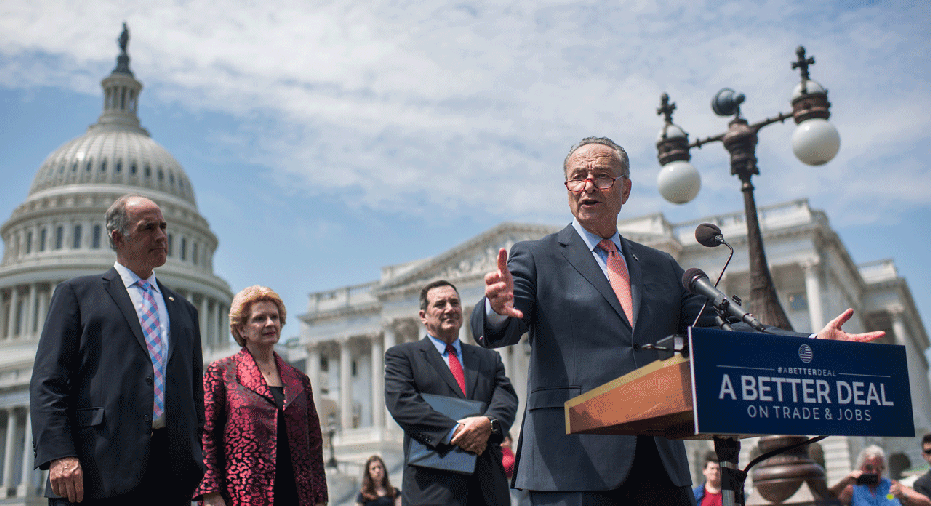Will Democrats hold debt ceiling hostage for tax reform bargaining power?

Democrats in the U.S. Congress wield little clout nowadays, but they will likely have plenty of influence on the looming issue of the U.S. debt ceiling and party leaders are considering whether they should try to convert that advantage into bargaining power on tax reform.
Even though they control the White House and both chambers of Congress, Republicans are again divided among themselves as pressing fiscal issues rattle financial markets and test President Donald Trump's ability to keep the country's accounts in order.
The debt ceiling is a legal cap on how much money the federal government can borrow to fund its budget deficits and meet debt obligations. Failure to meet payments could lead to a default and a downgrade in America's credit rating, with the potential to trigger global financial shockwaves.
Action is needed to raise the debt ceiling by Sept. 29, the administration has warned, although some fiscal experts say the deadline may actually be mid-October. The Trump administration wants Congress to pass a "clean" increase, without extraneous political measures attached.
But, reflecting long divisions in the party over fiscal policy, many conservative Republicans have said they will not vote for a debt-limit bill that does not also contain promises of federal spending cuts.
So, analysts say, Trump and Republican leaders will need the votes of Democrats, who generally favor a clean bill, to raise the debt limit and avoid a default.
Armed with this edge, Democrats are considering using the debt debate to press Republicans for bipartisan tax reform, said Democratic Senate aides, which would inject new uncertainty into the debt limit issue.
Overhauling the tax code is a top priority for Trump and his fellow Republicans, but they have made little progress since the president took office in January. Their behind-closed-doors planning process so far on tax reform has ignored the Democrats.
SCHUMER, PELOSI SKEPTICAL
Senate Democratic leader Chuck Schumer and House of Representatives Democratic leader Nancy Pelosi are skeptical about supporting a debt ceiling increase while Republicans pursue tax cuts that Democrats say would cause the federal deficit to balloon.
"We're telling Republicans that if it is their intention to use that debt limit increase to allow for tax cuts for the wealthy, that they are going to have a harder time getting Democratic votes," said a Senate Democratic aide.
Senate Democrats offered earlier this month to move forward with bipartisan legislation on taxes, on condition that changes do not add to the deficit or benefit the wealthy.
For now, Senate and House Democrats are watching Republicans and the Trump administration wrangle over the debt ceiling, with no clear plan yet in sight. Senate Majority Leader Mitch McConnell and House Speaker Paul Ryan have not said if they want a clean bill.
Ryan said on Thursday that Congress will pass legislation to raise the federal debt ceiling, noting that lawmakers have several options. McConnell has said the debt ceiling will be raised, a spokesman said on Thursday.
Pelosi spokesman Drew Hammill said in an email: "Leader Pelosi has expressed support for a clean debt ceiling hike, but has also echoed the concerns that many House Democrats have about supporting such a move while Republicans simultaneously blow a multi-trillion dollar hole in the deficit with tax cuts for millionaires and billionaires."
'BAD PRECEDENT'
Given the stakes, Schumer and Pelosi would face a daunting task in holding their parties' lawmakers together if they want to squeeze concessions out of Republicans with the country on the brink of a potential default.
Some Democrats are skeptical such a strategy could work.
"We ought to get the debt ceiling done. It's a bad precedent to try to use the debt ceiling for leverage for other political objectives," said Representative John Yarmuth, the top Democrat on the House Budget Committee.
Democratic leaders have little to show for their opposition to Trump up to now, despite the president's sagging poll numbers and public friction between him, Ryan and McConnell.
Democrats have been talking about using the debt ceiling as a lever against Republican tax reform since June and laid out their conditions for working together on tax legislation in an Aug. 1 letter to Trump and Republican leaders.
McConnell flatly rejected the idea of broad bipartisanship. But it could be the only way forward on taxes if Republicans cannot agree on a budget resolution for fiscal 2018. That is needed to unlock a legislative provision that would allow them to pass a tax bill in the Senate, where Republicans have only a slim majority, without Democratic support.
There also are signs of new delays for the stated Republican goal of finishing tax reform this year. The Republican tax reform team has not been able to agree on a plan to release a framework for legislation next month, as expected.
Nevertheless, in an interview with the Financial Times published on Friday, Gary Cohn, who is a top Trump aide as director of the National Economic Council, said he believed a bill could pass tax committees in both chambers and be passed by both the House and Senate by the end of 2017.
(Additional reporting by Amanda Becker; Editing by Kevin Drawbaugh and Frances Kerry)



















